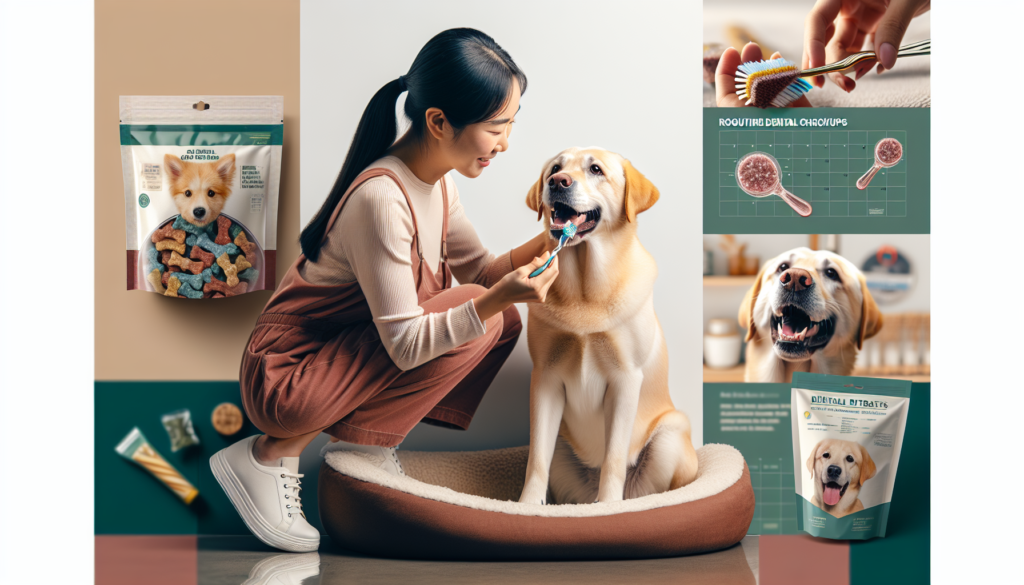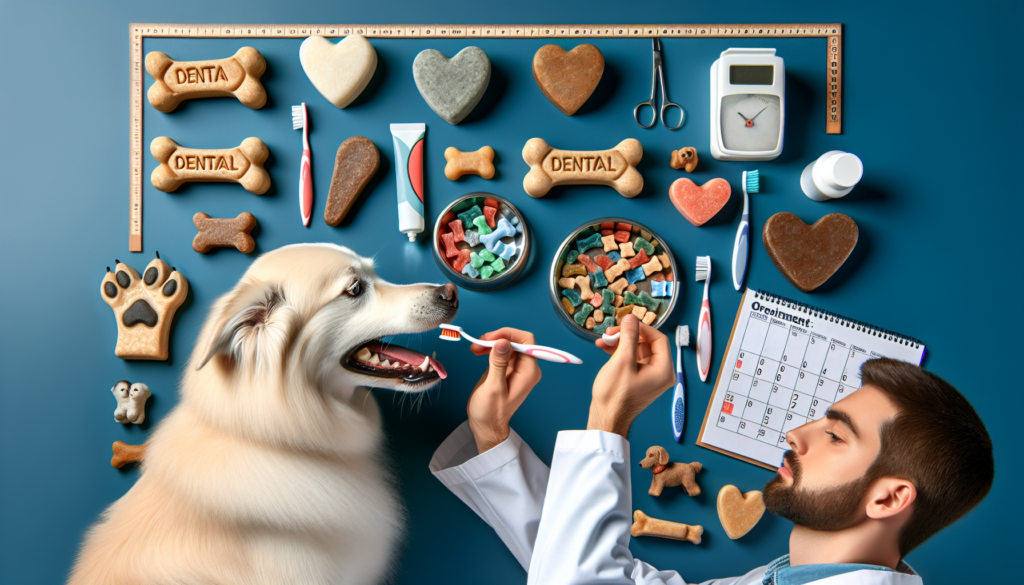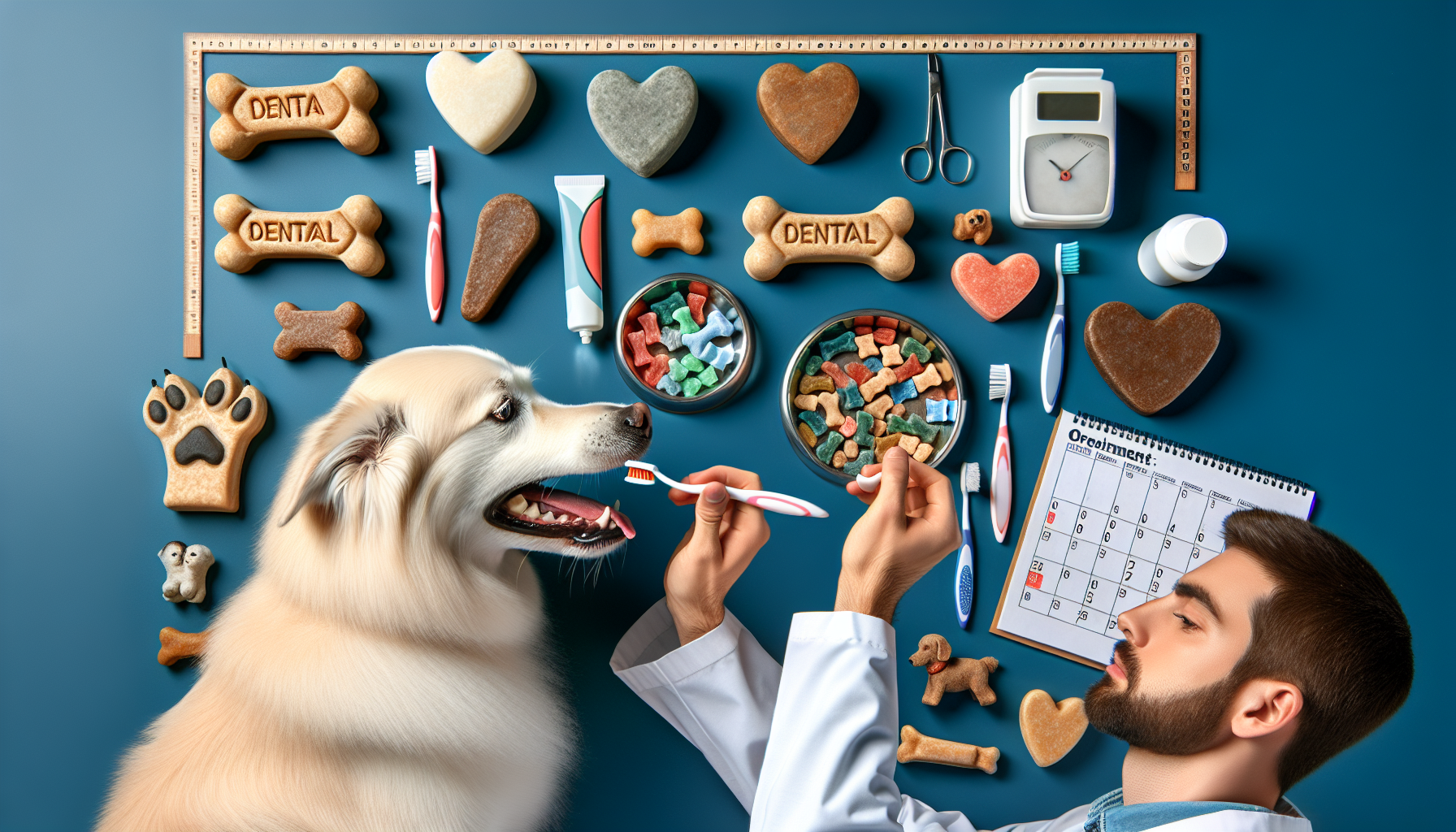Have you ever wondered how to keep your furry friend’s pearly whites shining bright? Look no further than our comprehensive “Guide to Doggy Dental Care.” In this article, we’ll walk you through the importance of proper dental hygiene for your canine companion, and provide you with easy-to-follow tips and techniques to ensure their dental health stays in tip-top shape. With our step-by-step guide, you’ll be able to tackle the challenge of doggy dental care with ease, leaving your four-legged friend with a fresh and healthy smile. So let’s get started on this journey towards a happier and healthier mouth for your beloved pup!

Dental Health Importance for Dogs
Dental health is not only critical for humans but also for our furry friends. Just like us, dogs can develop dental problems that can cause pain, discomfort, and even serious health issues if left untreated. Ensuring good dental health for your dog is essential for their overall well-being. From preventing common dental problems to addressing any existing issues, taking care of your dog’s teeth should be a priority. By implementing regular preventive measures, understanding the signs of dental problems, and seeking professional dental cleanings when necessary, you can significantly improve your dog’s oral health and quality of life.
Common Dental Problems in Dogs
Just like humans, dogs can experience several dental problems. Some of the most common issues include tooth decay, gum disease, tooth fractures, and tartar buildup. Tartar is a hard substance that accumulates on the surface of the teeth, leading to gum irritation and infection. If left untreated, these dental problems can progress and cause pain, difficulty eating, and even tooth loss. Identifying these issues early on is crucial for prompt treatment and preventing further complications.
Effects of Poor Dental Health
Poor dental health can have adverse effects on your dog’s overall health and well-being. Untreated dental problems can lead to chronic pain, difficulty eating, and malnutrition. Additionally, the bacteria associated with dental issues can enter the bloodstream and affect vital organs such as the heart, liver, and kidneys. This can potentially lead to severe medical conditions and reduce your dog’s lifespan. By taking proactive steps to maintain good dental health, you can prevent these negative consequences and ensure your dog leads a happy and healthy life.
Preventive Measures
Preventing dental problems in dogs starts with a proactive approach to their dental care. By implementing a few simple preventive measures, you can significantly reduce the risk of dental issues and promote good oral hygiene.
Regular Veterinary Check-ups
Regular veterinary check-ups are essential for monitoring your dog’s dental health. During these appointments, your veterinarian will examine your dog’s teeth and gums, check for any signs of dental problems, and recommend any necessary treatments or preventive measures. These routine check-ups allow early detection and intervention, preventing minor issues from escalating into major dental problems.
At-Home Dental Care
Implementing a regular at-home dental care routine is vital for your dog’s oral health. Brushing their teeth daily is one of the most effective ways to remove plaque and prevent tartar buildup. Use a dog-specific toothbrush and toothpaste to ensure their safety and effectiveness. Additionally, consider using dental wipes or oral rinses as complementary cleaning options. These at-home dental care practices will help maintain your dog’s dental hygiene in between professional cleanings.
Tooth-Friendly Diet
A tooth-friendly diet can significantly impact your dog’s dental health. Opt for high-quality dog food that promotes good oral hygiene. Look for products that are specifically formulated to reduce tartar buildup and promote healthy teeth and gums. Avoid feeding your dog excessive amounts of sugary or starchy treats, as they can contribute to dental problems. Instead, provide them with dental chews or treats that help clean their teeth while satisfying their chewing needs.
Chew Toys and Dental Treats
Chew toys and dental treats are excellent additions to your dog’s dental care routine. These toys and treats are designed to help massage the gums, remove plaque, and clean the teeth. Opt for products that are specifically designed to promote good oral health. Avoid toys or treats that are too hard or can be easily chewed into small pieces, as they may pose a choking hazard. Regularly inspect these items for signs of wear or damage and replace them when necessary.
Signs of Dental Problems
As a responsible dog owner, it is vital to be able to recognize the signs of dental problems in your furry friend. Knowing what to look for can help you address any issues promptly and seek appropriate treatment. Keep an eye out for the following signs:
Bad Breath
If your dog has persistent bad breath, it may be a sign of dental problems. Foul-smelling breath is often caused by the buildup of plaque and tartar, which can lead to gum disease and tooth decay. While dogs may naturally have slightly unpleasant breath, any significant change should be investigated.
Excessive Drooling
Excessive drooling can be an indication of oral discomfort and should not be ignored. If you notice your dog’s drooling has significantly increased, it could be a sign of dental issues. This can also be accompanied by pawing at the mouth or rubbing their face against surfaces.
Discolored or Loose Teeth
Discolored or loose teeth are clear signs of dental problems. If you notice any changes in the color or stability of your dog’s teeth, it is essential to have them examined by a veterinarian. Discolored teeth may indicate decay or infection, while loose teeth can be a result of advanced gum disease.
Bleeding or Inflamed Gums
Bleeding or inflamed gums are common indications of gum disease in dogs. If you observe any bleeding or redness in your dog’s gums, it is crucial to seek veterinary attention. Ignoring these symptoms can lead to more severe oral health issues, including tooth loss and systemic infections.
Professional Dental Cleanings
While at-home dental care is essential, it is also vital to schedule regular professional dental cleanings for your dog. Veterinary dental cleanings provide a deeper level of cleaning and ensure any underlying issues are addressed appropriately.
When to Schedule a Dental Cleaning
Consult with your veterinarian to determine the appropriate frequency of dental cleanings based on your dog’s specific needs. In general, most dogs require professional cleanings once or twice a year. However, certain factors such as breed, age, and existing dental conditions may warrant more frequent cleanings. Your veterinarian will evaluate your dog’s oral health and recommend the ideal schedule.
What to Expect during the Procedure
During a professional dental cleaning, your dog will be placed under general anesthesia to ensure their safety and comfort. The veterinarian will thoroughly examine their teeth and gums, removing any plaque, tartar, and calculus. They may also perform dental X-rays to assess the health of the tooth roots and jawbone. If necessary, any diseased teeth may be extracted, and the gums will be treated. Throughout the procedure, your dog’s vital signs will be closely monitored to ensure their well-being.
Aftercare and Post-Cleaning Tips
Following a dental cleaning, your dog may need some time to recover from the anesthesia. Your veterinarian will provide specific aftercare instructions, which may include dietary restrictions and pain management. It is crucial to follow these instructions closely to promote the healing process and prevent any complications. Additionally, maintain your dog’s at-home dental care routine to prolong the benefits of the professional cleaning.

Brushing Your Dog’s Teeth
Brushing your dog’s teeth is one of the most effective ways to maintain their dental health. Although it may require some patience and practice, regular toothbrushing is crucial for preventing dental problems and keeping their breath fresh.
Choosing the Right Toothbrush and Toothpaste
When selecting a toothbrush for your dog, opt for a soft-bristled brush specifically designed for pets. Avoid using human toothbrushes, as they may be too harsh for their delicate gum tissue. Similarly, choose a toothpaste formulated specifically for dogs. Human toothpaste contains ingredients that can be toxic to dogs if ingested.
Getting Your Dog Comfortable with Toothbrushing
Introducing your dog to toothbrushing gradually can help them become comfortable with the process. Start by allowing them to sniff and lick the toothpaste to familiarize themselves with the taste. Then, gradually introduce the toothbrush by gently touching it to their teeth and gums. Reward your dog with praise and treats to create positive associations with toothbrushing.
Step-by-Step Guide to Brushing
To brush your dog’s teeth effectively, follow these steps:
- Lift their lips to expose their teeth and gums.
- Apply a small amount of dog-specific toothpaste to the toothbrush.
- Gently brush in a circular motion, focusing on the gum line and all tooth surfaces.
- Pay particular attention to the back teeth, as they are more prone to tartar buildup.
- Gradually increase the brushing time as your dog becomes more comfortable.
- Finish the brushing session with praise and treats to reinforce positive behavior.
Alternative Dental Cleaning Methods
If brushing your dog’s teeth is challenging or not suitable for their temperament, alternative dental cleaning methods can still help maintain their oral health.
Dental Wipes and Oral Rinses
Dental wipes and oral rinses provide an additional means of cleaning your dog’s teeth. Dental wipes are pre-moistened pads that can be gently rubbed along the gum line and tooth surfaces, helping to remove plaque. Oral rinses, when added to your dog’s drinking water, can help combat bacteria and freshen their breath. These supplementary cleaning options can be especially useful if your dog resists toothbrushing or has sensitive gums.
Water Additives
Water additives are designed to be added to your dog’s drinking water, promoting good oral hygiene. These additives often contain enzymes or antimicrobial agents that help reduce plaque and tartar buildup. Simply mixing the recommended amount of water additive with your dog’s fresh water can provide an easy and convenient way to improve their oral health.
Antler Chews and Raw Bones
Antler chews and raw bones can serve as natural teeth-cleaning tools for your dog. The chewy texture of these treats helps remove plaque and tartar while providing an enjoyable chewing experience. However, it is important to choose appropriate-sized chews and bones that match your dog’s size and chewing habits. Always supervise your dog during chewing sessions to prevent any choking hazards or tooth fractures.
Oral Health Products for Dogs
A variety of oral health products are available on the market to support your dog’s dental care efforts. These products can help promote good oral hygiene and combat dental problems.
Dental Gels and Sprays
Dental gels and sprays are specifically formulated to reduce plaque and tartar buildup. They often contain enzymes or other active ingredients that help inhibit the growth of bacteria. These products can be applied directly to your dog’s teeth and gums, providing an additional layer of protection and freshness.
Oral Cleansing Sprays
Oral cleansing sprays are convenient options for freshening your dog’s breath and promoting good dental health. These sprays often contain ingredients that combat bacteria and remove plaque. Simply spray the recommended amount onto your dog’s teeth and gums, focusing on areas where plaque tends to accumulate.
Dental Chews and Treats
Dental chews and treats are specially designed to promote good oral hygiene. They are typically shaped to reach various nooks and crannies of your dog’s mouth, effectively removing plaque and massaging the gums. Look for products with the Veterinary Oral Health Council (VOHC) seal of acceptance, as they have been evaluated for their effectiveness in reducing tartar.
Specialized Toys
Specialized dental toys can also contribute to your dog’s dental health. These toys are designed with textures and shapes that help remove plaque and stimulate gum tissues. Some toys are even hollow, allowing you to fill them with dog-friendly toothpaste or dental gels. Regular chewing on these toys can help maintain your dog’s dental hygiene while providing mental stimulation.
Special Considerations for Puppies and Senior Dogs
Different life stages require specific attention when it comes to dental care. Puppies and senior dogs have unique dental needs, and addressing them can significantly improve their oral health.
Puppy Teething and Dental Care
Puppies experience a teething phase when their baby teeth are gradually replaced by adult teeth. This process can be uncomfortable for them and may lead to increased chewing and gum irritation. Providing appropriate chew toys specifically designed for teething can help soothe their discomfort and encourage healthy chewing habits. Additionally, it is essential to establish a toothbrushing routine from an early age to promote good oral hygiene.
Senior Dog Dental Health
As dogs age, they become more susceptible to dental problems. It is important to closely monitor your senior dog’s dental health and address any issues promptly. Regular dental cleanings and a tooth-friendly diet are even more critical during this stage of life. Consult with your veterinarian to develop an appropriate dental care plan tailored to your senior dog’s needs.
Addressing Dental Anxiety and Fear
Some dogs may experience dental anxiety or fear, making dental care challenging. Fortunately, there are strategies to help alleviate their stress and create a positive dental care experience.
Building Positive Associations with Dental Care
Start by creating positive associations with dental care. Associate toothbrushing with pleasant experiences, such as praise, treats, and playtime. Gradually increase the duration and intensity of toothbrushing sessions while maintaining a positive and calm environment. Patience and consistency are key to helping your dog overcome dental anxiety.
Gradual Desensitization Techniques
Gradual desensitization can help dogs become more comfortable with dental care procedures. Start by introducing them to the sights, sounds, and smells associated with dental care. Let them explore the toothbrush, toothpaste, or other dental cleaning tools at their own pace. Gradually progress to touching their teeth and gums until they become comfortable with each step. This process requires patience and a gentle approach to ensure your dog feels safe and secure.
Additional Tips for Doggy Dental Care
In addition to the above measures, consider the following tips to ensure optimal dental care for your dog:
Regularly Inspecting Your Dog’s Mouth
Regularly inspecting your dog’s mouth can help identify any changes, such as inflamed gums or broken teeth. Take a few moments each week to gently lift your dog’s lips and examine their teeth and gums. If you notice anything unusual or concerning, consult with your veterinarian for further evaluation and guidance.
Appropriate Dental Care for Specific Breeds
Certain dog breeds may have specific dental care needs. For example, small breeds are more prone to dental problems due to overcrowded teeth, while brachycephalic breeds (e.g., Bulldogs, Pugs) may require extra attention to prevent breathing difficulties during dental procedures. Understanding your dog’s breed-specific dental concerns can help you tailor their dental care routine accordingly.
By following these comprehensive guidelines and implementing a proactive approach to your dog’s dental health, you can significantly improve their overall well-being. Regular veterinary check-ups, proper at-home dental care, and preventive measures such as tooth-friendly diets and chew toys will contribute to their oral hygiene. Additionally, recognizing the signs of dental problems, seeking professional cleanings when necessary, and addressing dental anxiety will ensure your furry friend has a healthy and happy smile for years to come.

